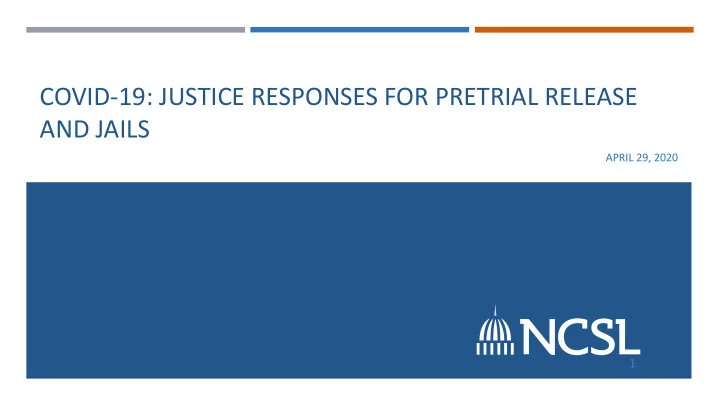

COVID-19: JUSTICE RESPONSES FOR PRETRIAL RELEASE AND JAILS APRIL 29, 2020 1
AGENDA FOR COVID-19 VIRTUAL MEETING Welcome Amber Widgery, NCSL program principal Chief Justice Bridget McCormack, Michigan Supreme Court Director Laurie K. Dudgeon, Kentucky Administrative Office of the Courts Q&A This virtual meeting is made possible through the generous support of The Pew Charitable Trusts' public safety performance project.
NOTES FOR TODAY’S VIRTUAL MEETING Type your questions in the chat box on the right side of your screen. Questions will be read by the moderator. Do not share your screen under any circumstances. This meeting will be recorded. The recording and slides will be publicly posted: https://www.ncsl.org/research/civil-and-criminal-justice/justice- responses-to-covid-19-ncsl-virtual-meetings-resources.aspx 3
RESPONDING TO COVID-19 WITH EXISTING LEGAL FRAMEWORKS CITATION IN LIEU OF ARREST Citation in lieu of arrest Release eligibility Presumptions of release on recognizance and least restrictive conditions Limiting financial conditions of release Victim safety and participation 4
CITATION IN LIEU OF ARREST CITATION IN LIEU OF ARREST Citation in lieu of arrest is permitted in every state. State laws generally provide law enforcement agencies and individual officers with discretion for using citations. 5
CITATION IN LIEU OF ARREST CITATION IN LIEU OF ARREST Most states authorize citations for low-level offenses. Eight states allow the use of citations for certain felonies. Seven states provide general authorization for law enforcement to issue citations without specifying level of offense. Misdemeanors General Misdemeanors & Felonies Authority 6
RELEASE ELIGIBILITY 19 states have a broad constitutional right to release, authorizing preventative detention only for capital defendants. For all other defendants, conditions of release must be set. 22 states have constitutional provisions that limit preventative detention to statutorily or constitutionally defined defendants. Release conditions must be set for all other defendants. The remaining 9 states have statutory, not constitutional, provisions that allow for some form of limited preventative detention. 7
COURT GUIDANCE: LEGAL PRESUMPTIONS CITATION Nearly half the states have a presumption of release on recognizance or non-financial conditions. At least 18 have a presumption of release on the least restrictive or onerous conditions. A handful of additional states require the courts first consider recognizance or less restrictive means of release before requiring more restrictive conditions of release. 8
LIMITATIONS ON FINANCIAL CONDITIONS Significant Recent Legislation has: Limited courts’ ability to impose financial conditions in certain cases or prohibited financial conditions for certain classes of offenses. Required courts to consider a defendant’s ability to pay financial conditions or pretrial supervision fees. Sped up review of conditions of release for those who aren’t able to meet initial conditions. 9
VICTIMS AND THE PRETRIAL PROCESS The majority of states give victims the right to be notified of a defendant’s release. The majority of states have laws addressing victim participation during the pretrial stage. This includes the right to be heard or the right to be consulted. Other considerations: Cooling off periods Consideration of victim safety 10
UPCOMING VIRTUAL MEETINGS IN THIS SERIES COVID-19: Congressional Appropriations for Justice and Homeland Security Programs Wednesday, May 6, Noon PT / 3 p.m. ET Register for Virtual Meeting COVID-19: Juvenile Justice Responses* Wednesday, May 13, Noon PT / 3 p.m. ET Register for Virtual Meeting COVID-19: Federal Justice and Homeland Security Agency Responses Wednesday, May 20, Noon PT / 3 p.m. ET Register for Virtual Meeting COVID-19: Justice Responses for Community Supervision* Wednesday, May 27, Noon PT / 3 p.m. ET Register for Virtual Meeting *This virtual meeting is made possible through the generous support of The Pew Charitable Trusts' public safety performance project. 13
Recommend
More recommend